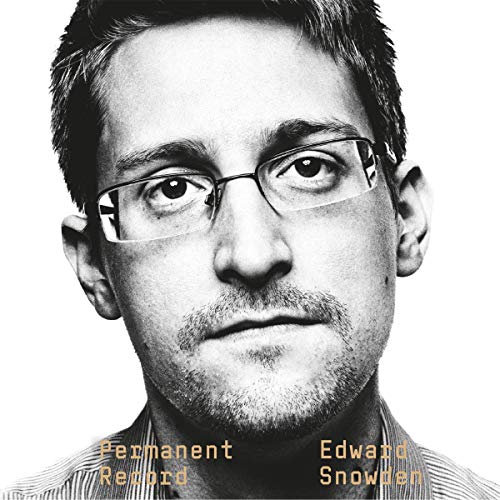 |
Permanent Record Edward Snowden Holter Graham (Narrator) B07VZWH6NB |
读这本书的最原始的目的是为了get inspired。我以前从来不爱看传记类的,觉得这些将军总统商界成功人士的自我标榜宣传很没有意义,所谓的成功并不可以也不值得复制。现在的想法是,并不是要复制主人公的经历,而是去理解主人公对自己经历的解读、和对自己解读的解读。读完斯诺登的自传,感觉不仅是了解了他这个人,还从科技的角度理解了真相,而最多的是从人类发展的层面懂得了什么事情为什么发生了。我最原始的目的达成了,只不过是从一个让我没有预料到的斯宾诺莎式的“真理即爱”的觉悟方法。
用一句话总结我读完这本传记的收获是:它让我自己从两个新的角度来看待这个问题:第一是隐私的意义;第二是其中科技扮演的角色所带来的两个问题(法律滞后和信息观)。
America’s fundamental laws exist to make the job of law enforcement not easier but harder. This isn’t a bug, it’s a core feature of democracy. In the American system, law enforcement is expected to protect citizens from one another. In turn, the courts are expected to restrain that power when it’s abused, and to provide redress against the only members of society with the domestic authority to detain, arrest, and use force -including lethal force.
…
Potential monitoring abuses piled up in my mind to cumulatively produce a vision of an appalling future. A world in which all people were totally surveilled would logically become a world in which all laws were totally enforced, automatically, by computers. After all, it’s difficult to imagine an AI device that’s capable of noticing a person breaking the law not holding that person accountable. No policing algorithm would ever be programmed, even if it would be, toward leniency or forgiveness.
…
Extreme justice can turn out to be extreme injustice, not just in terms of the severity of punishment for an infraction, but also in terms of how consistently and thoroughly the law is applied and prosecuted. Nearly every large and long-lived society is full of unwritten laws that everyone is expected to follow, along with vast libraries of written laws that no one is expected to follow, or even know about.
…
Put simply, a world in which every law is always enforced would be a world in which everyone was a criminal.
这一段完全颠覆了我的三观,完全没有想到作者为隐私正名的角度不是全面监视导致误伤无辜(minority report),而是法律被完美执行后的恶果。每个人都是凡人,都有被攻击的缺点;既然是凡人,就不该以神仙的标准来被神仙治理;执法者不是神,应该被限制其能力,不能让执法者通过收集利用隐私来变成神仙;隐私和民主有机的关系;法律和规则本身的存在的不完备定理。每一段都看得我目瞪口呆、心服口服、心里只有膜拜。
The word “privacy” itself is somewhat empty, because it is essentially indefinable, or over-definable. Each of us has our own idea of what it is. “Privacy” means something to everyone. There is no one to whom it means nothing.
It’s because of this lack of common definition that citizens of pluralistic, technologically sophisticated democracies feel that they have to justify their desire for privacy and frame it as a right. But citizens of democracies don’t have to justify that desire – the state, instead, must justify its violation. To refuse to claim your privacy is actually to cede it, either to a state trespassing its constitutional restraints or to a “private” business.
There is, simply, no way to ignore privacy. Because a citizenry’s freedoms are interdependent, to surrender your own privacy is really to surrender everyone’s. You might choose to give it up out of convenience, or under the popular pretext that privacy is only required by those who have something to hide. But saying that you don’t need or want privacy because you have nothing to hide is to assume that no one should have, or could have, to hide anything – including their immigration status, unemployment history, financial history, and health records. You’re assuming that no one, including yourself, might object to revealing to anyone information about their religious beliefs, political affiliations, and sexual activities, as casually as some choose to reveal their movie and music tastes and reading preferences.
Ultimately, saying that you don’t care about privacy because you have nothing to hide is no different from saying you don’t care about freedom of speech because you have nothing to say. Or that you don’t care about freedom of the press because you don’t like to read. Or that you don’t care about freedom of religion because you don’t believe in God. Or that you don’t care about freedom to peaceably assemble because you’re a lazy, antisocial agoraphobe. Just because this or that freedom might not have meaning to you today doesn’t mean that it doesn’t it won’t have meaning tomorrow, to you, or to your neighbor – or to the crowds of principled dissidents I was following on my phone who were protesting halfway across the planet, hoping to gain just a fraction of the freedoms that my country was busily dismantling.
太厉害了!点头如捣蒜,privacy从哪来,privacy是什么,为什么privacy要被捍卫。因为隐私的存在不是一个人的事,所以你不能用你自己不需要隐私作为理由来放弃你自己的隐私,因为放弃你自己的隐私等于是在放弃别人的隐私。但是就算是那些作者抛开隐私用来做例子的、作者看来最基础不可能不care的东西,现在就是有很多人理所当然地不care。
然后再说为什么隐私被侵犯的问题以前好像没那么严重,现在怎么了?一方面是因为9/11之后的负罪感加走极端,另一方面正如传记的标题所涉及的是科技发展的因素。并不是说科学发展有底线,科技发展却没有,只是因为科技发展的速度比科学发展的快太多了,真的来不及及时地审视它、了解它。
接下来最恐怖的是信息所有者和信息使用者对信息的诠释,这又和我们的日常生活联系在一起了。使用data predict我们其实是在dehumunize我们(猜你喜欢、新闻定制还是新闻特制)。隐私是在保护我们免遭用数据定义我们的暴力偏见,这个暴力偏见现在美名其曰AI。
这本书我高亮的地方太多,下面简单记录几个随便吐槽的点。
- 儿时的记忆,电脑比游戏机好,因为它可靠。
- 斯诺登研究教纲来决定策略,很像中国人啊。我也爱研究规则大于真正执行它。
- 政治+资本主义=钱权交易,所以有政府合同工。政府给间谍也缺斤少两对待(unpaid overtime、shitty hotel),斯诺登争取正当福利的经历让我想到了我自己,我把自己抬太高了。
- 斯诺登是看清了没有合法路径才作出行为的。高密的合理性vs为自己的利益的leak(vs中国举报的区别)。
- 斯诺登不激进,只是在希望让船回港。
- 好想多看一些八卦细节,比如女朋友怎么来的俄罗斯、父母怎样了、在俄罗斯如何营生、和俄罗斯政府达成了怎样的交易。
还有关于永久记录对一个人的影响,我个人觉得蛮不讲道理的。以前我看到美国找到候选人年轻时候的文章或者观点来攻击ta觉得很惊讶,为什么观点要一致呢?重点是当事人自己的选择,有力量的人可以outgrow these opinions。这种翻旧帐的永久记录不能也不应该作为理由来以此威胁/否定这个人啊。
最后不得不提一句中译版,这本书几乎是和原版同步地被翻译引进了,但是中文版有所删减到了斯诺登本人都不满意的程度了。然后豆瓣上有人给这本书的中文版打一星,有的人觉得这对中文版很不公平很委屈,能够把这本书引进出版已经是顶着多大的压力和风险了。对此我有几个感想:
- 你愿意要审查版的google吗?
- 愿意要审查版的(删减版的)和对它打一分不矛盾。删减版的打满分的话,不删减的打几分?
- 出版删减版简直就是行为艺术。书本身探讨的是真相公开,出版的目的也是传达新闻公开,出版中文版的手段则必须是删减。
- 如果结合最近《Rick & Morty》第四季被A站正版引进来讨论更有意思,选择完整的盗版而不是删减的正版,是不是对艺术品更尊重更值得呢?